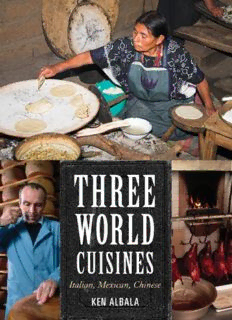
Three world cuisines : Italian, Mexican, Chinese PDF
Preview Three world cuisines : Italian, Mexican, Chinese
THREE WORLD CUISINES AltaMira Studies in Food and Gastronomy General Editor: Ken Albala, Professor of History, University of the Pacific ([email protected]) AltaMira Executive Editor: Wendi Schnaufer ([email protected]) Food Studies is a vibrant and thriving field encompassing not only cooking and eating habits but issues such as health, sustainability, food safety, and animal rights. Scholars in disciplines as diverse as history, anthropology, sociology, literature, and the arts focus on food. The mission of AltaMira Studies in Food and Gastronomy is to publish the best in food scholarship, harnessing the energy, ideas, and creativity of a wide array of food writers today. This broad line of food-related titles will range from food history, interdisciplinary food studies monographs, general interest series, and popular trade titles to textbooks for students and budding chefs, scholarly cookbooks, and reference works. Appetites and Aspirations in Vietnam: Food and Drink in the Long Nineteenth Century, by Erica E. Peters Three World Cuisines: Italian, Mexican, and Chinese, by Ken Albala THREE WORLD CUISINES Italian, Mexican, Chinese KEN ALBALA A division of ROWMAN & LITTLEFIELD PUBLISHERS, INC. Lanham • New York • Toronto • Plymouth, UK The publisher has done its best to ensure that the instructions and/or recipes in the book are correct. However, users, especially parents and teachers working with young people, should apply judgment and experience when preparing recipes. The publisher accepts no responsibility for the outcome of any recipe included in this volume. Published by AltaMira Press A division of Rowman & Littlefield Publishers, Inc. A wholly owned subsidiary of The Rowman & Littlefield Publishing Group, Inc. 4501 Forbes Boulevard, Suite 200, Lanham, Maryland 20706 www.rowman.com 10 Thornbury, Plymouth PL6 7PP, United Kingdom Copyright © 2012 by AltaMira Press All rights reserved. No part of this book may be reproduced in any form or by any electronic or mechanical means, including information storage and retrieval systems, without written permission from the publisher, except by a reviewer who may quote passages in a review. British Library Cataloguing in Publication Information Available Library of Congress Cataloging-in-Publication Data Albala, Ken, 1964— Three world cuisines : Italian, Mexican, Chinese / Ken Albala. p. cm. Includes bibliographical references and index. ISBN 978-0-7591-2125-6 (cloth : alk. paper)— ISBN 978-0-7591-2126-3 (pbk. : alk. paper)—ISBN 978-0-7591-2127-0 (ebook) 1. International cooking. 2. Food habits—Italy—History. 3. Food habits—Mexico—History. 4. Food habits—China—History. I. Title. TX725.A1A315 2012 394.1'20945—dc2 2012000686 The paper used in this publication meets the minimum requirements of American National Standard for Information Sciences—Permanence of Paper for Printed Library Materials, ANSI/NISO Z39.48-1992. Printed in the United States of America Map of Italy. xxiii Map of Mexico. xxiv Map of China. xxv Figure 1.1. Satyricon scene. 40 Figure 1.2. Galen. 42 Figure 1.3. Preparing chocolate. 54 Figure 2.1. Draining Peking ducks. 70 Figure 2.2. Cittara. 75 Figure 2.3. Mortar. 76 Figure 2.4. Hand quern. 77 Figure 2.5. Ancient olive oil press. 77 Figure 2.6. Batticarne. 79 Figure 2.7. Food mill. 80 Figure 2.8. Duck roasting. 81 Figure 2.9. Comal. 86 Figure Newly seasoned wok. 87 2.10. Figure Chinese tools. 90 2.11. Figure Molinillo. 91 2.12. Figure Chinese rolling pin. 92 2.13. Figure Tortilla press. 93 2.14. Figure Meat grinder. 94 2.15. Figure 3.1. Panettone. 105 Figure 3.2. Sifter. 106 Figure 3.3. Ravioli. 107 Figure 3.4. Steamed buns. 110 Figure 3.5. Chinese noodles. 111 Figure 3.6. Jiaozi. 112 Figure 3.7. A cut Mooncake. 113 Figure 3.8. Whole mooncake. 114 Figure 3.9. Blue corn. 119 Figure Cooking tortillas on a comal. 120 3.10. Figure Grilled corn. 121 3.11. Figure Millet. 125 3.12. Figure Lasagne. 134 3.13. Figure Pizza. 138 3.14. Figure Cornetti. 141 3.15. Figure Coarse tortilla. 142 3.16. Figure Zeppole. 144 3.17. Figure 4.1. Broccoli rabe. 151 Figure 4.2. Fresh water chestnuts. 153 Figure 4.3. Swiss chard. 157 Figure 4.4. Variety of bean species. 158 Figure 4.5. Wood ear mushrooms. 163 Figure 4.6. Nopalitos. 165 Figure 4.7. Tomatillos. 168 Figure 4.8. Baby artichokes. 174 Figure 4.9. Minestrone. 176 Figure 5.1. Produce market, China. 178 Figure 5.2. Goji berry. 180 Figure 5.3. Fresh lychees. 189 Figure 5.4. Durian. 190 Figure 5.5. Mangosteens. 191 Figure 5.6. Nuts of ginkgo. 197 Figure 5.7. Preserved plums. 200 Figure 5.8. Paleta. 203 Figure 6.1. Edible insects. 207 Figure 6.2. Cheese shop, Milan, Italy. 214 Figure 6.3. Cheesemaker, Parma, Italy. 215 Figure 6.4. Food shop window, Bologna, Italy. 219 Figure 6.5. Carne asada. 232 Figure 6.6. Meatballs. 235 Figure 6.7. Lion’s head meatball. 237 Figure 6.8. Felino. 238 Figure 6.9. Menudo. 242 Figure Stir-fry with chicken and vegetables. 244 6.10. Figure Pumpkin seed sauce. 247 6.11. Figure Classic hot and sour soup. 249 6.12. Figure Tea egg. 251 6.13. Figure 7.1. Market, Lantau, Hong Kong. 262 Figure 7.2. Baccalà. 265 Figure 7.3. Jellyfish. 267 Figure 7.4. Mackerel. 269 Figure 7.5. Dim sum. 272 Figure 7.6. Ceviche. 277 Figure 8.1. Olive press. 288 Figure 8.2. Rue. 293 Figure 8.3. Epazote. 294 Figure 8.4. Lily buds. 296 Figure 8.5. Annatto (achiote). 300 Figure 8.6. Market, Guizhou Province, China. 301 Figure 8.7. Pods of the tamarind. 303 Figure 8.8. Piloncillo. 304 Bottles of black vinegar and rice Figure 8.9. 306 wine. Figure 9.1. Cacao pods. 319 Figure 9.2. Ingredients for medicinal Chinese tea. 321 Figure 9.3. Traditional Chinese clay pot. 322 Figure 9.4. Pu er. 323 Figure 9.5. Pulquería, Mexico City. 327 Figure 9.6. Roman woman pouring wine. 329 Figure 9.7. Agave harvest. 332
Description: